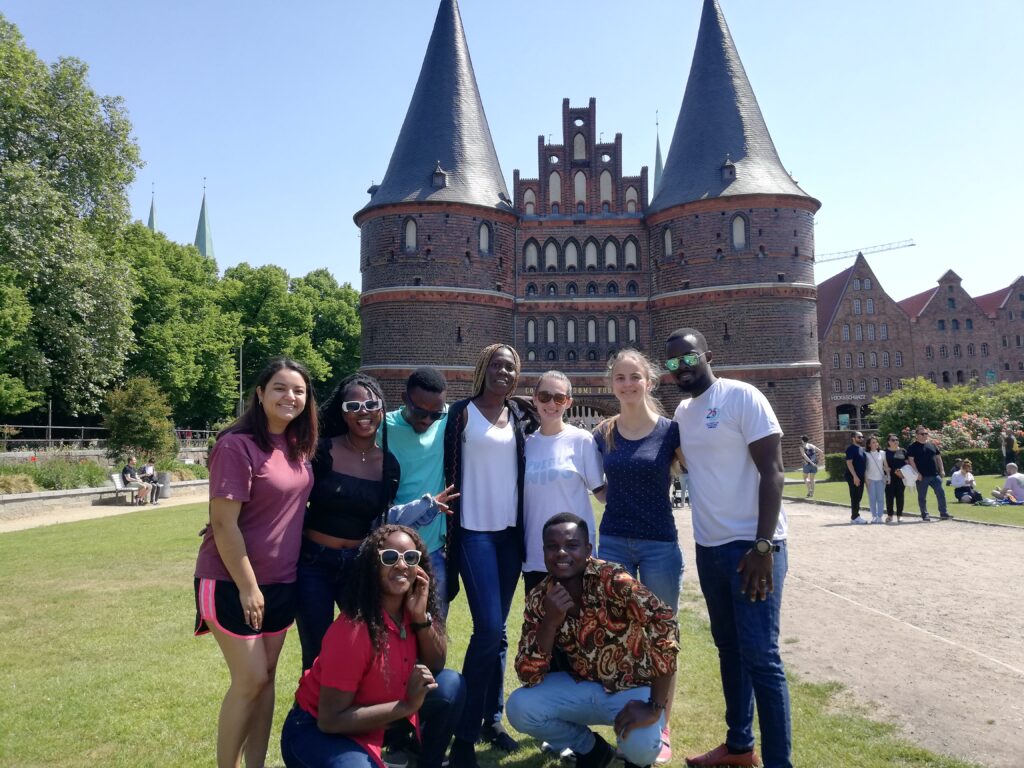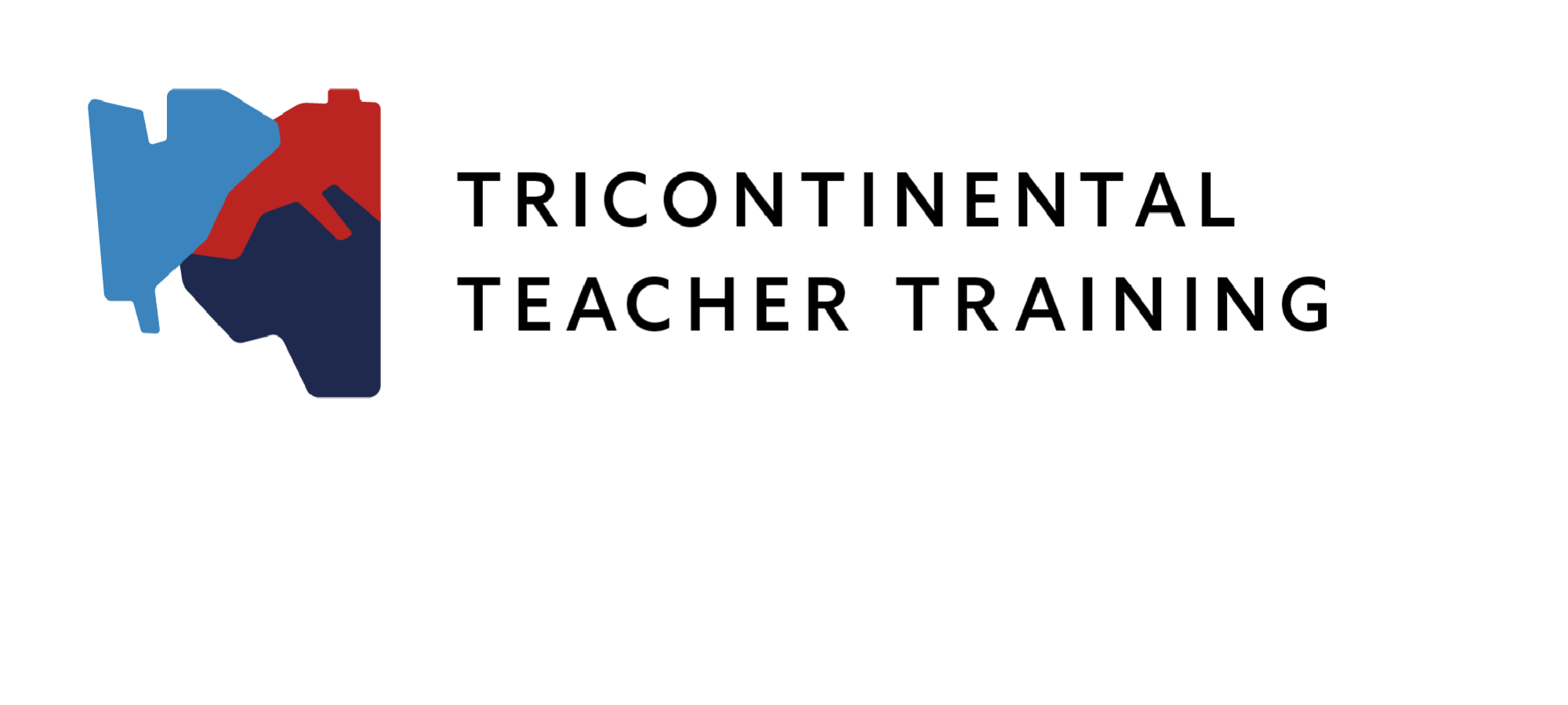This week was scheduled to be a “flexi week”. It means that all participants of the Tricontinental Teacher Training program are expected to visit different schools other than our usual internship school. This provided us with the opportunity to explore different schools and experience different pedagogies and to enjoy the beautiful city of Hamburg. The schools of visit were Gymnasium Farmsen and Gymnasium Klosterschule, and some also visited their German buddies’ school.
On Monday 5th June, 2023, a group of UNC (University of North Carolina) and UEW (University of Education, Winneba) buddies visited Gymnasium Farmsen School. We were welcomed by Konrad Pahlke, who was our mentor for the day. He had invited us to his school to reflect and share our experiences at the KZ-memorial Neuengamme with his students and to observe a history lesson with his class. During the lesson, Mr. Konrad (class teacher for day) grouped his students into four (4) and asked the TTT buddies to join each group for the presentation. The TTT buddies switched to different groups after each presentation session so as to benefit from all the four groups. They presented on the topics of the French and Russian Revolution, and their impact.
Participants came together in group sessions that focused on a single topic. Within each group, every student/buddy contributed thoughts and ideas that encouraged discussion and collaboration among us within each group.

Seminar on history and post colonialism by Prof. Dr. Andreas Körber: German History and Memory Culture(s) and History Education
On Tuesday 6th June, 2023, all TTT buddies gathered for a lecture by Prof. Andreas Körber on the German history and post colonialism. There was massive student participation as we shared our experiences and asked critical questions for which Prof. Körber was ready to assist us.

Brief history
Hamburg (and Germany) History and Memory Culture is characterized by a set of thematic complexes which do not easily interrelate. Germany as such is often considered a “late nation” having been unified to a “nation state” in the late 19th century only, from a very large set of independent territories (kingdoms, principalities, free towns, church territories, etc.) via several steps in the 19th century – long after other European countries like Spain, France etc.
This was finally brought about by Otto von Bismarck’s initiation of a war with France, against which the remaining states united. Pride in unification (as an empire) therefore is one motif of public memory culture, especially in monuments etc. from the turn of 19th to 20th century.
In 1914, the German Empire again incited a war it believed was imminent nevertheless, what came to be “the World War” – number one, as we now count it – and lost in 1918, after which a revolution took place, Germany became a democratic republic (Weimar), the emperor was forced abroad.
In 1933, Germany again experienced a stark change: National Socialism (the Nazis), a right wing political stream, which in part connected to the old (empire-true) right, but more so to Fascist ultra-nationalist ideas, and had a very strong anti-Semitic ideology, came to power (or took over), and overthrew the democratic republic into a totalitarian dictatorship – albeit the majority of Germans seem to have consented, while part of the population, especially Jewish (both Germans and foreign), Sinti and Roma, but also political adversaries (communists, social democrats, and others) were brutally persecuted, discriminated against, many killed etc. – Germany was to become “judenfrei” (clear of all Jewish people).
Germany built several monuments to commemorate those who were persecuted and in some cases killed. Here are some of the monuments serving as remembrance:

These children groups commemorate hundreds of transports of children and young people who left the Hanseatic city from November 1938 to August 1939 from the “Gau Groß-Hamburg” and the entire “German Reich” by ships and from train stations. They travelled unaccompanied by their parents to countries whose language and culture they did not know, thus survived the shoa.

Some of the critical observation we made during the tour include the following:
- University of Hamburg was founded in the year 1919 after the First World War.
- Germany was divided into two; the western Germany (France and Italy allies) and the eastern Germany (Serbia ally).
- After the Second World War, some of the Jewish were driven away, others took their own lives and some emigrated.
- This year Hamburg commemorated 80 years of being destroyed during the Second World War.
- Some Jewish also died in the Neuengamme Concentration Camp.
- Now, there are two Jewish communities in Hamburg.
- On 9th November every year, University of Hamburg holds a ceremony to commemorate those who died.
- There is an ongoing discussion in Hamburg as to whether they remember the victims enough.
Wednesday 7th June, 2023

As we always have it on our schedule, we had a reflective seminar together with all buddies from UNC, UEW and UHH. The previous week was full of excursions and trips so it was prudent we have this reflection. We all contributed immensely our experiences from the visit to Neuengamme, a trip to Berlin and the post-colonial (History of Germany) tour with Prof. Dr. Andreas Körber. We were also given an activity to work in our DMP groups.
Visit to Winterhuder Reformschule
On Friday 9th June, 2023, a group of TTT fellows led by Michael (former TTT participant) visited Winterhuder Reformschule. The experiences we had from the school are as follows:
Experiences from the school
- Project learning: people choose their own projects through the assistance of their teacher. Children decide their own work schedule at least two projects a year.
- No grading until age 8.
- Report cards are provided to students but do not form the bases for someone to be promoted to the next grade. The teacher has no power to make a student repeat a grade, but students can always skip a grade level depending on his/her intellectual ability.
- Just like what we observed in different schools, Winterhuder Reformschule is an all-inclusive school that admits even students from different countries including refugees. The school has special education teachers and a guidance and counseling unit that addresses the needs of each child in the school. Each class is called by names of different kinds of animals. No specific reasons were given for the naming but for easy identification.
- Most often, the class goes on a trip for probably a couple of days.
- Fridays are usually for sporting activities.
- Winterhuder Reformschule has a student population of over 1200 and 147 teachers as well.

A day trip to Lübeck
On Saturday 10th June, 2023, Dr. Markus Friederici led a group of TTT buddies to Lübeck to explore some historical sites and monuments that serve as remembrance. This trip was made optional per our weekly schedule, so only those who were interested embarked on the journey.

During the tour around the town, we learnt that Lübeck was known for commercial salt production. Meat and other food were processed using salt in the absence of other products. The town attracted a lot of people and served as a center for trade. Due to this, officials usually collected tax at the entrance of Lübeck before anyone was allowed inside the town. Lübeck is also called city of the seven peaks because of the slope of the town. Lübeck was beautiful, prosperous and bigger than Hamburg.

Sammy, Emma and Yvonne.
